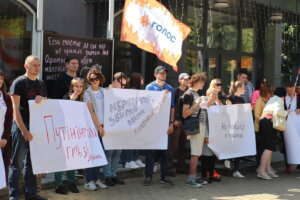It hearkened back to the Soviet era of televised “Space Bridges” between America and the USSR. But this was no history lesson.
On July 7, Moscow’s propagandist Dmitri Kiselev announced that Russian Channel One would partner with Ukraine’s pro-Russian NewsOne channel to air a television conference between the people of the two countries. It would be called “We Need to Talk.”
But Ukrainians didn’t see this as an opportunity to promote understanding with the citizens of Russia. Instead, the planned teleconference sparked outrage across the country and protests in Kyiv — promptly leading to the broadcast’s cancellation.
Even President Volodymyr Zelensky got involved. On July 8, he termed the planned broadcast a “cheap but dangerous PR stunt.” Instead, he called upon Putin to meet with him in Minsk, Belarus in the presence of United States President Donald Trump, British Prime Minister Theresa May, German Chancellor Angela Merkel and French President Emmanuel Macron.
“We don’t reject any diplomatic formats, we offer to talk,” Zelensky said. “We need to talk, indeed.”
Zelensky has never met or talked with Putin as president. Meanwhile, Russia has intensified its military, economic and diplomatic pressure on Ukraine since the politically inexperienced Zelensky took office in May.
The televised conference, scheduled for July 12, would have been the first joint TV show between the two countries since Russia annexed Crimea and started the war in eastern Ukraine in 2014.
Russian television anchor Dmitry Kiselev, widely regarded as the country’s chief propagandist, first announced the teleconference on July 7. He compared it to the “Space Bridge,” a series of interactive teleconferences between people of the U.S. and the USSR, which were broadcast in the 1980s.
The NewsOne channel, which is allegedly controlled by pro-Russian politician Viktor Medvedchuk, claimed in its statement on July 8 that the teleconference was to be held “between the common people of Ukraine and Russia” and that viewers are “looking forward to this event.”
Medvedchuk is running to parliament as the third candidate on the party list of the pro-Russian Opposition Platform — For Life political party. According to polls, it has the second highest level of support after Zelensky’s party for the upcoming July 21 parliamentary elections.
Zelensky claimed the teleconference was specially scheduled right before elections in order to artificially divide the country into two camps: nationalists and pro-Russian voters.
“The politicians who strongly want to get into parliament are now manipulating you,” Zelensky said.
If the televised conference were to spark clashes, it would create “great footage for Russian TV” and allow Russia to appeal for an end to Western sanctions as Ukraine supposedly refuses to engage in dialogue, the president added.
Zelensky also called on the nation to remain calm and announced that the government would have an “appropriate reaction.” He did not provide any further details.
After news of the pro-Russian teleconference broke, Ivan Bakanov, the acting head of the SBU state security service, initiated an urgent meeting of the National Security and Defense Council.
In a statement published on the SBU website, Bakanov said that the agency has issued a warning to the media-holding News, which owns NewsOne, saying it will be held responsible for carrying out the conference with a Russian broadcaster sanctioned by the Ukrainian government.
Bakanov said he would propose that the National Security and Defense Council impose sanctions against the television channels involved in the conference.
On the morning of July 8, dozens of representatives of the Golos political party of rock singer Svyatoslav Vakarchuk picketed in front of NewsOne’s headquarters. Several more protests were scheduled there later in the day.
NewsOne later announced it would cancel the show due to threats of physical violence against the channel, its journalists and their families.

Supporters of Golos party picket the NewsOne TV channel in Kyiv on July 8. (STANISLAV STRILETS)
